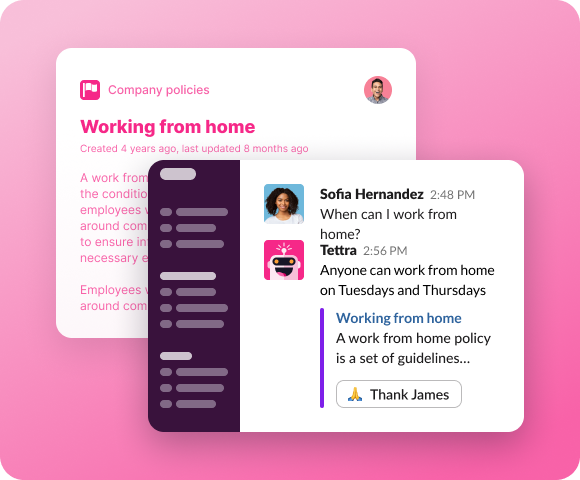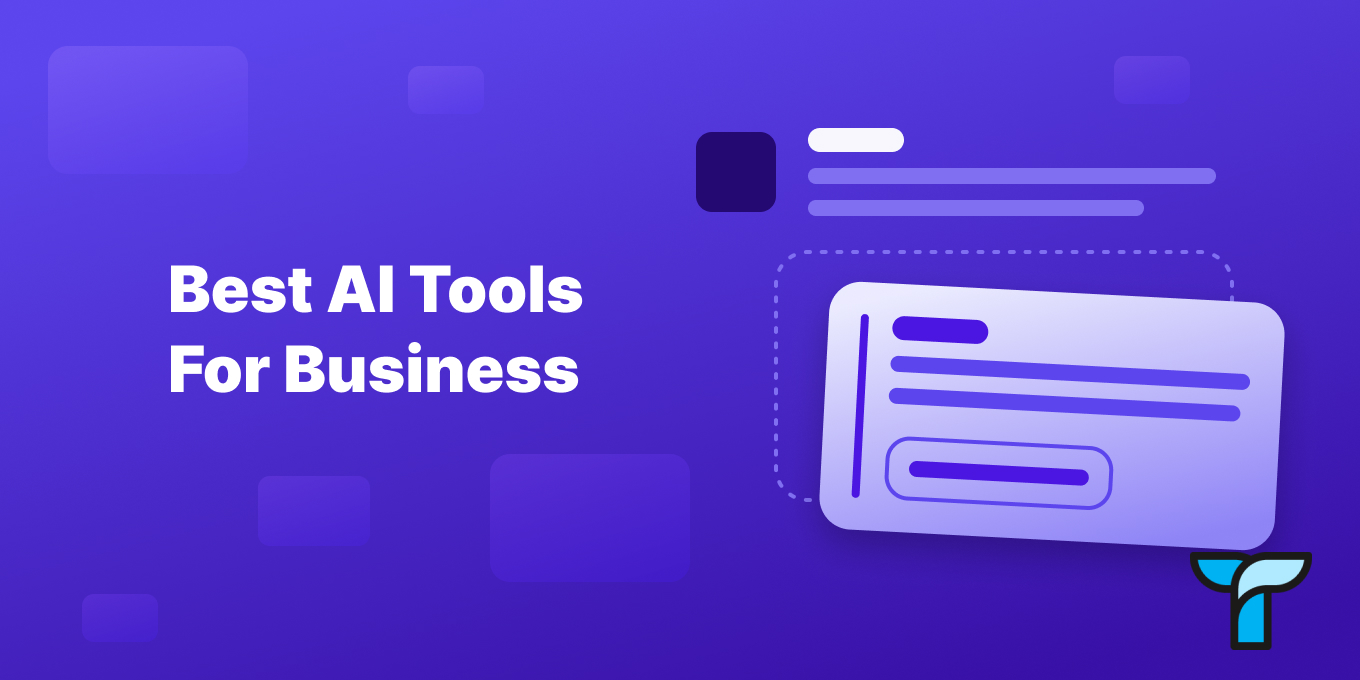Businesses of all shapes and sizes are giving a creative spin to AI.
Take, for instance, Velvet Tacos, a trendy tacos eatery. It harnessed the power of AI to cook up its weekly specials. Not to be outdone, Shake Shack, the renowned fast-food chain, utilized Notc, an AI food tech company, to concoct its NotMilk™ product, a new non-dairy shake and frozen custard.
AI has come a long way from being a simple idea-generator or a tool that helped combat the dreaded blank-page syndrome.
Today it has evolved into a sophisticated technology adopted by businesses across various sectors making daily tasks a breeze, saving precious time, and enhancing overall efficiency.
What are the applications of AI tools in business?
Businesses are witnessing a new dawn, thanks to the transformative power of AI tools. Here are some key applications:
- Data analysis: AI can sift through copious amounts of data, spotting trends and patterns that might slip past the human eye. This results in better, data-driven decisions.
- Customer experience: Chatbots and virtual assistants use AI to deliver personalized service, answering queries faster than you can say “customer satisfaction” resulting in better customer engagement.
- Sales and marketing: AI can identify potential customers, customize marketing campaigns, and even take over mundane tasks allowing your sales team to direct their focus on bigger strategies.
- Supply chain and inventory management: AI-powered systems can forecast demand, optimize logistics, and manage inventory resulting in reduced operational costs and a boost in productivity.
- Risk management: AI tools can analyze patterns in data, and sniff out potential risks and fraud, enhancing your business’ security.
How can small businesses use AI?
AI has the potential to revolutionize businesses, offering strategic advantages through enhanced customer service, marketing, and content creation.
AI platforms like ChatGPT can automate processes and personalize experiences, proving invaluable to businesses of any size.
For example, businesses can use AI tools to create customer segments and deliver targeted marketing messages, leading to stronger connections with customers.
Embracing AI can provide small businesses with a competitive advantage, enabling them to offer faster customer service, build stronger connections with customers through personalized marketing, and streamline their content creation process.
What AI tools should you explore for your business?
1. Tettra (Kai for AI)
Use it for: Knowledge base
Instead of forcing your team to go searching for a hard-to-find answer, team members can ask Kai (the AI bot in Tettra) in Slack or inside Tettra.
Tettra’s AI-powered search and answer capabilities with Kai help your team find exactly what they’re looking for. It’s fast, accurate, and supports natural language queries, making it a must-have for any scaling team.
The answer will be pulled in from your Tettra knowledge base, or, if the information does not currently exist, the question can be assigned to a subject matter expert.
Read more about how to use Kai and Tettra.

Pros
- A single source of truth
- Ask questions in Slack or Tettra for AI answers
- Keep your knowledge up to date with Verification tools
- AI tagging, categorization, and organization
Cons
- While Tettra offers customization to a certain extent, it may not meet all the unique needs of your organization.
- As Tettra is primarily cloud-based, offline access to information may be limited.
Review
“We recognized Google Docs wouldn’t scale for us. We really wanted to evaluate what our teams needed to succeed, and it became clear they needed one place to find all of the information [they needed]…Tettra had a great mix of features. It was just powerful enough and just simple enough to meet our needs.”
– Kristina Getty, Director of Accelerator Operations at TechStars
2. TensorFlow
Use it for: Predictive analytics
With TensorFlow, a supercharged machine learning library, businesses can dive deep into the realm of advanced predictive analytics.
It takes all the historical data and unlocks insights into customer behavior, demand forecasting, and market trends. By harnessing the power of TensorFlow, businesses can fine-tune inventory management, laser-target their marketing campaigns, and make data-driven decisions. The result is enhanced operational efficiency and a lean, mean, cost-effective machine.
Pros:
- Deep learning makes it easy to navigate through complex data
- Scales easily to accommodate large datasets
- Allows for custom model development to suit specific business needs
Cons:
- Demands knowledge of machine learning and data science
- Resource intensive; demands high computational power
- Setting it up and initial implementation can be time-consuming
Reviews
“TensorFlow is flexible. It provides a platform for building and deploying machine learning models across a wide range of devices and media. A few things I dislike about TensorFlow are it is resource intensive; TensorFlow is really resource intensive. It requires high computational power and a powerful GPU.”
– G2
3. ParsePrompt.ai
Use it for: Repurposing audio or video content
ParsePrompt is an AI-powered tool that makes it easy to repurpose content. Content creators, business owners, and Youtubers can use this tool to automatically generate blog posts and other content from existing media assets, like Youtube videos, audio files, PDFs, and even existing web-pages.
This tool even integrates with Zapier, so you can bake this capability into your workflows and regenerate existing content at scale.
Pros:
- Write written content from Youtube videos or audio clips with AI
- Integrates with thousands of apps (using Zapier)
- Chrome extension available for on-demand processing needs
- Simple app
Cons:
- No free forever plan
- Only integrates with OpenAI or Anthropic. No support for open-source models
- Requires an understanding of API keys
Review:
“ParsePrompt is enabling TFTC to reach our content growth goals with incredible ease and speed. What would have taken us a team of ten and thousands of dollars has been accomplished with a team of one for a fraction of the cost.”
– Marty Bent
4. Phrasee
Use it for: Automated email marketing
Phrasee’s remarkable AI-powered platform allows you to boost your email marketing campaigns. It crafts engaging and bespoke subject lines and email content, tailored to each recipient by studying user behavior and response data.
This results in emails that resonate with the individual recipient, leading to better open rates, click-through rates, and conversions. It’s like having a personal concierge for your email marketing! Phrasee also automates your email marketing, driving revenue growth while cutting down on manual labor.
Pros:
- Better open rates and conversion rates
- Automates email content generation
- A/B tests different email aspects for maximum performance
Cons:
- Steep learning curve for new users
- Limited control on individual email content demands constant monitoring
- Regular content and language monitoring can be time-consuming
Pricing
- Generate: US$ 500 per month
- Generate + Optimize: Contact sales
Reviews
“The kind of engagement it provides with customers is really unique and effortless. The process of combining data is sometimes a pain for its users. Lacks seamless functioning.”
– G2
5. QuickBooks Online
Use it for: Automated bookkeeping
QuickBooks Online, equipped with AI and machine learning, makes bookkeeping easy. It takes over mundane tasks such as categorizing expenses, reconciling transactions, and generating financial reports, making the accounting process less daunting. But that’s not all.
By automating bookkeeping, QuickBooks Online minimizes errors, saves time, and provides a crystal-clear snapshot of your business’s financial health. This allows you to make informed financial decisions, shaping your business’s future with confidence.
Pros:
- Simplifies bookkeeping process
- Easily integrates with your bank accounts
- Easy to use, even for non-accounting professionals
Cons:
- Lacks customization for advanced accounting needs
- Limited reporting options compared to its competitors
- Subscription-based pricing can become costly for large businesses
Pricing
- Simple start: US$ 30 per month
- Essentials: US$ 55 per month
- Plus: US$ 85 per month
- Advanced: US$ 200 per month
Reviews
“It is an easy way to keep track of bookkeeping. It can be a little glitchy. And there are some limitations to it that are bothersome. The search function is particularly frustrating.”
– G2
6. Coda
Use it for: Docs & organized workflows
Coda AI is an AI-powered work assistant that does most of the heavy lifting when it comes to mundane tasks, ignites creative brainstorming ideas, and generally streamlines all your repetitive workflows.
Currently, in its beta stage, Coda AI is open for users to try for free. It’s like having a personal assistant in your pocket that helps you stay more organized and get more out of your notes with the power of AI. For example, you can ask it to extract data from a table, summarize a block of content, or generate new content.
Pros:
- Auto generates summaries and action items
- AI-powered templates make it easy to get started
- Writes and edits content from scratch
Cons:
- Still in the beta stage
- Need to be on the Enterprise subscription to get access
- Will be available only on paid plans
Pricing
Currently in Beta and available to users on the Enterprise subscription.
7. FIN (from Intercom)
Use it for: Customer support
Fin, an AI-powered customer support assistant, uses your support content to deliver quick and accurate answers that resolve customer questions and eases the load of growing ticket volume on your CS team. The chatbot feeds on your support content to find answers to common customer issues. Therefore, the more detailed your content, the better Fin’s responses.
Pros:
- Can quickly resolve most-asked queries
- Helps reduce your support volume
- Supported in multiple languages
Cons:
- The answers will only be as good as your support content
- Can get expensive if you get a ton of queries
- Will need constant monitoring and alterations to ensure the answers are accurate
Pricing
Fin pricing is measured in Resolutions. This means you only pay when Fin resolves a customer’s question. Fin is priced at $0.99 per resolution if you have an active Intercom subscription plan. It stores all the conversation in your inbox so your team can easily monitor all of Fin’s responses.
8. GitHub Copilot
Use it for: Coding suggestions
GitHub Copilot is your AI-powered sidekick in the world of coding. This brainchild of OpenAI and GitHub uses machine learning to sift through code repositories, serving up code suggestions and snippets as you type.
It enhances your productivity and overall coding process by slashing the chances of errors, particularly for repetitive or boilerplate code. It also fosters collaboration and knowledge sharing among developers by dishing out smart code suggestions gleaned from a massive trove of open-source code.
Pros:
- Works with all kinds of text editors
- Reduces manual coding errors
- Easy integrations with VS Code and other IDEs
Cons:
- The code isn’t always reliable
- Supported only a few programming languages
- Use of external data could lead to copyright and licensing concerns
Pricing
- Free
- Team: US$ 4 per user per month
- Enterprise: US$ 21 per user per month
Reviews
“This generative AI tool makes the day of a developer easier and increases his efficiency by handling things like basic functions based on the patterns that are present in the code. Basically it helps a lot but you cannot blindly trust whatever it is generating.”
– G2
9. Zendesk
Use it for: Customer support
Zendesk AI uses artificial intelligence to support your customer support operations. It automates routine ticket triaging and routes inquiries to the right agents, saving you time.
The AI feature goes beyond answering questions, it anticipates them, providing automated responses to common queries. Additionally, it offers sentiment analysis to gauge customer satisfaction levels. It even pinpoints areas that need a service tweak. All this results in quicker response times, happier customers, and agents freed up to tackle complex, more pressing issues.
Pros:
- Automated ticket routing and management
- Improved customer satisfaction with faster responses
- Sentiment analysis provides insights for improvement
Cons:
- Setting up the AI bot can be difficult
- Customers may not always appreciate being received by a bot
- May not work for more advanced queries
Pricing
Contact sales team for pricing tailored to your business.
10. Salesforce Einstein GPT
Use it for: Sales and CRM
Salesforce Einstein is a clever AI sidekick tucked away in Salesforce’s customer relationship management (CRM) software. It crunches numbers, sifts through customer data, and predicts what your customers are likely to do next.
Einstein offers personalized recommendations to your sales and marketing teams, takes care of repetitive tasks like lead scoring, and identifies promising sales opportunities. With these AI-powered insights, your business gets a custom-fit sales and marketing playbook which results in better customer engagement and a healthier bottom line.
Pros:
- Tailored customer interactions and recommendations
- Automates repetitive tasks
- Identifies sales opportunities
Cons:
- Can be an expensive option
- Setup and data integration requires specialized resources
- Demands regular monitoring and data maintenance
Pricing
Service Cloud Einstein list price starts at $50 user/month. You must have Enterprise or Unlimited edition to be eligible to purchase Service Cloud Einstein.
11. Tableau GPT
Use it for: Data-driven decision making
Tableau GPT, an all-new generative AI, simplifies data analysis for everyone on the Tableau Platform. This tool is committed to making data insights more accessible and easier to digest.
It boosts productivity and accelerates the time to value by offering smart suggestions and guidance within the product, effectively reducing repetitive tasks, and saving time for data analysts. All this empowers business users to make more informed decisions.
Pros:
- Improves data analyst productivity
- Automates repetitive tasks
- Offers personalized and contextual insights
Cons:
- Can get expensive to use
- Not the best after-sales support
- May have some security issues
Pricing
- Tableau Creator: US$ 70 per user per month | billed annually
- Tableau Explorer: US$ 42 per user per month | billed annually
- Tableau Viewer: US$ 15 per user per month | billed annually
How can you use AI in your business?
Achieving successful AI implementation in your organization requires strategic planning, resources, and a commitment to innovation.
Here are a few things to keep in mind when thinking about using AI in your business:
- Understand your business needs and objectives, and pinpoint how AI can streamline your processes or add value for your customers or teams.
- Find the most suitable AI solution for your needs, considering factors such as scalability, flexibility, and ease of integration.
- Train your AI model with a comprehensive dataset so it can learn patterns and make informed predictions. Working with data scientists and AI experts for model development and fine-tuning can help.
- Regularly monitor the AI model’s performance to ensure it delivers expected outcomes. Key performance indicators that align with your business objectives will help measure its impact.
Continuous refinement and improvement of your AI model is key to maintaining a competitive advantage.


